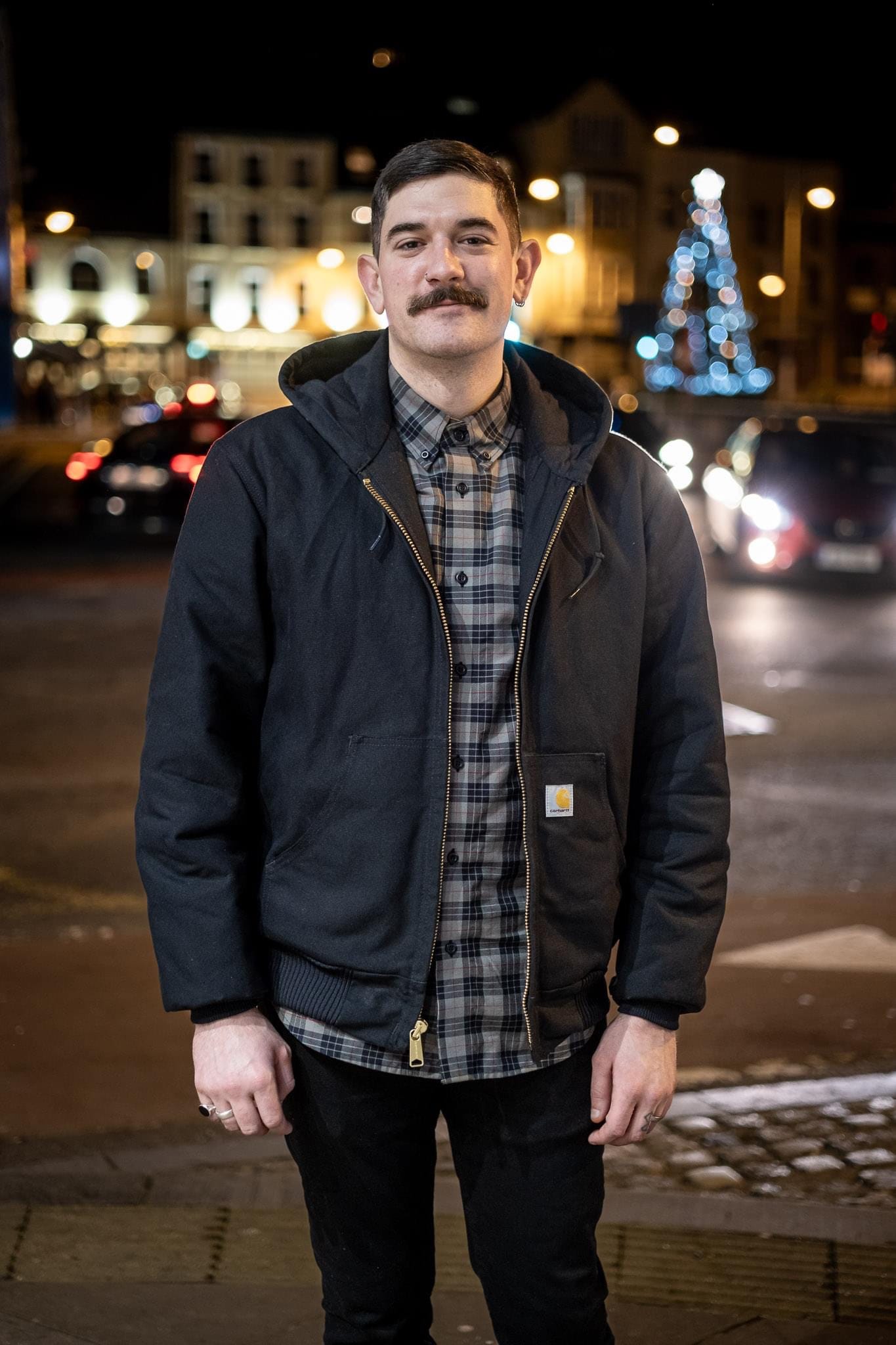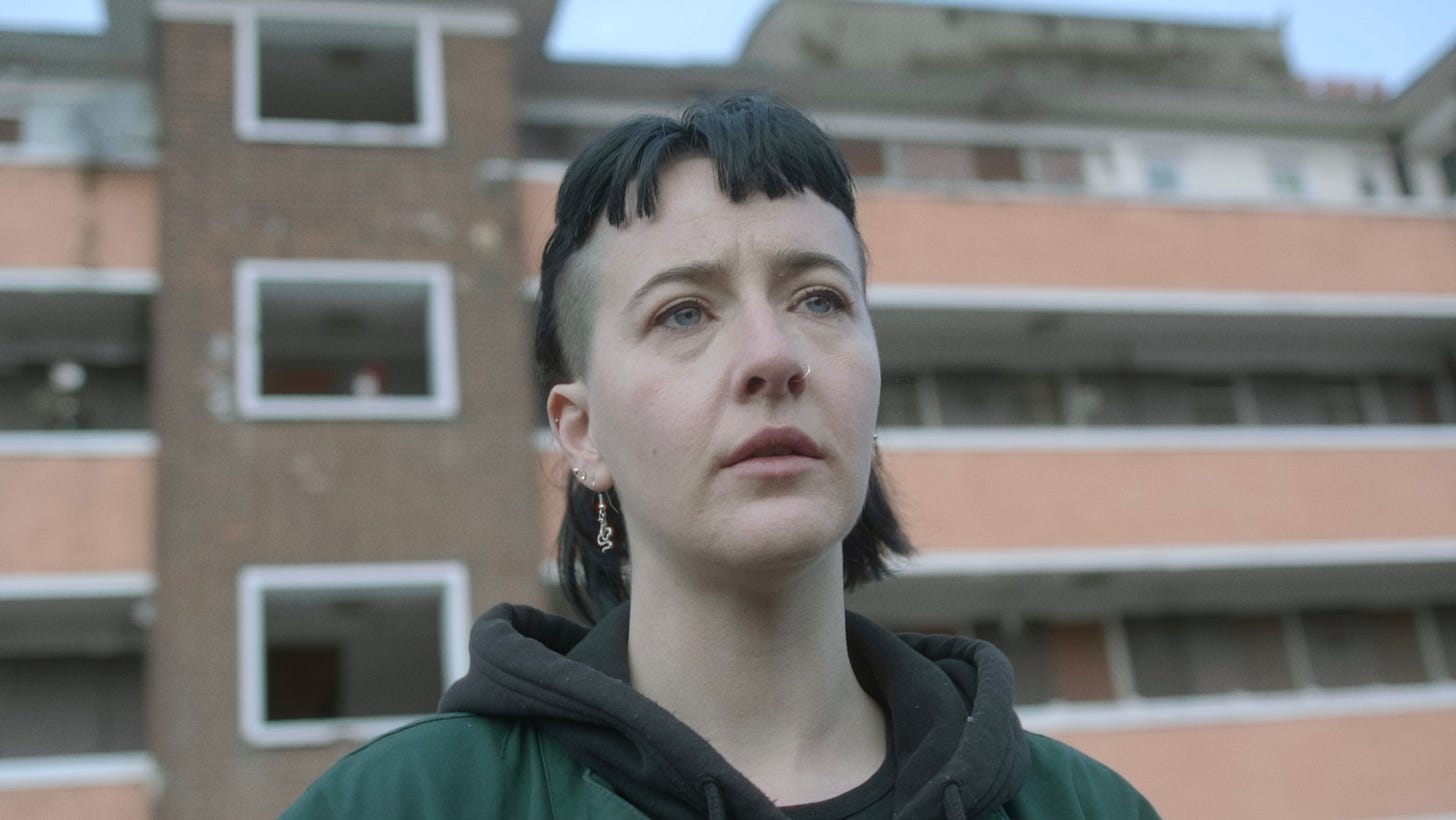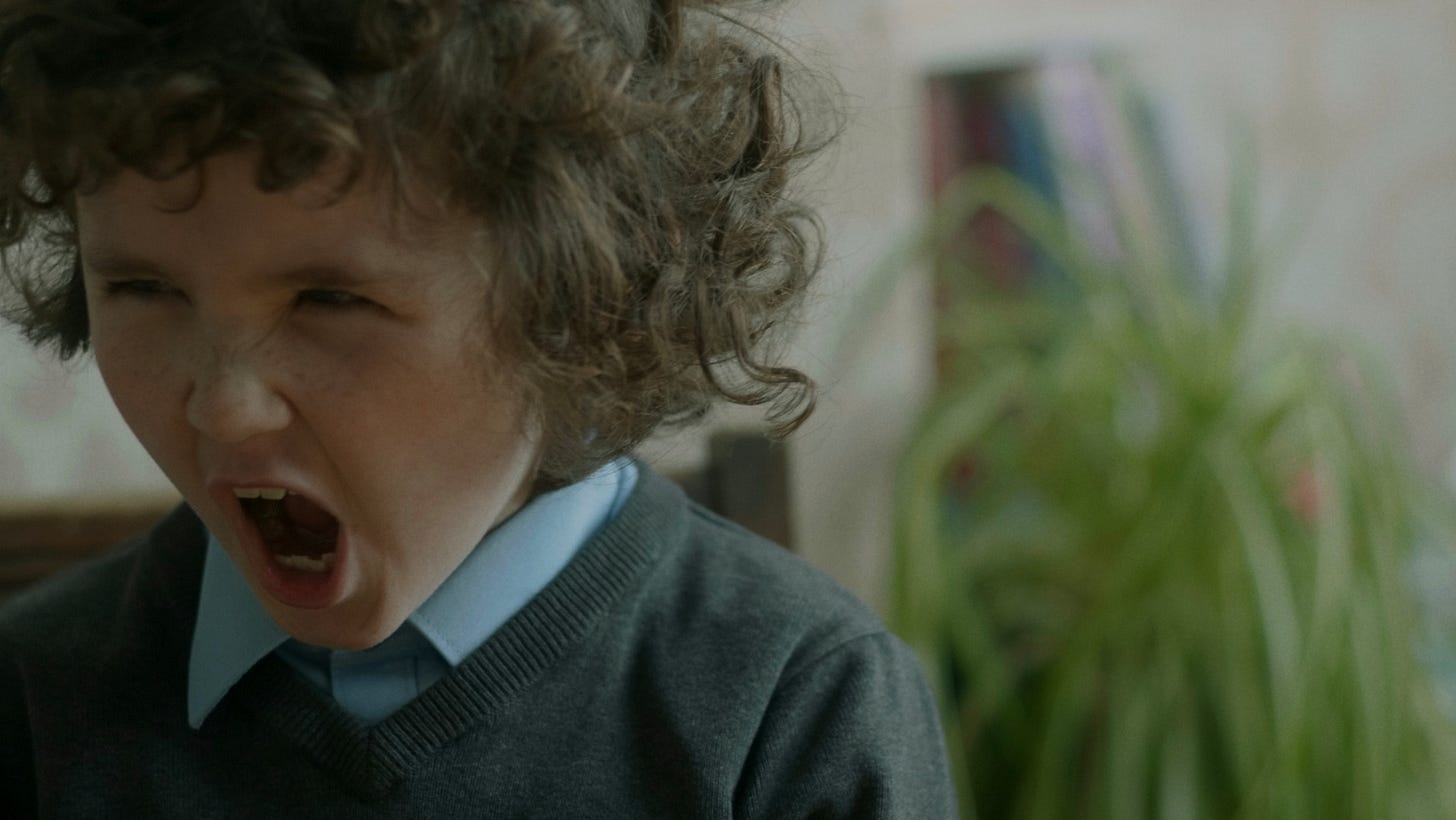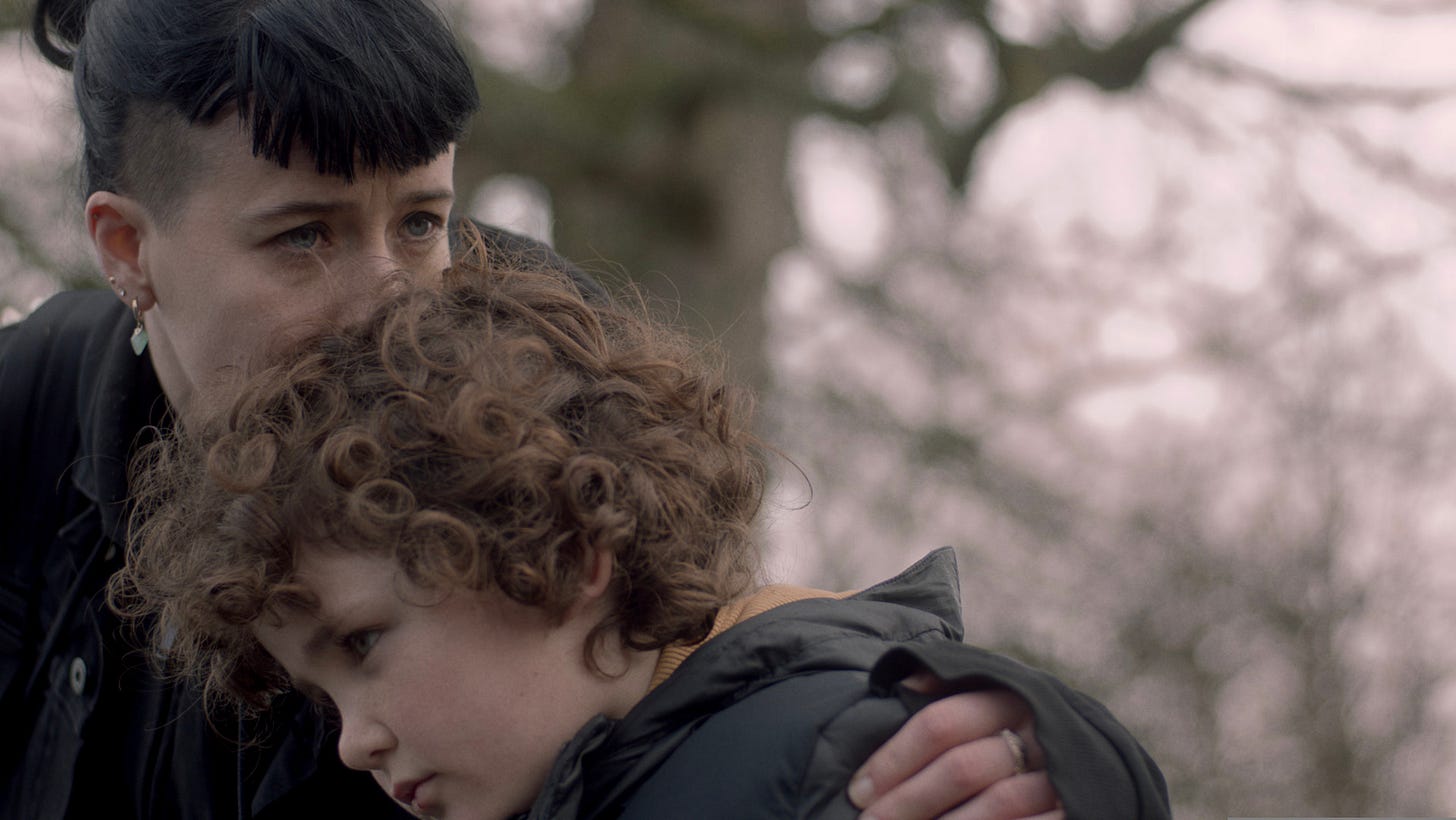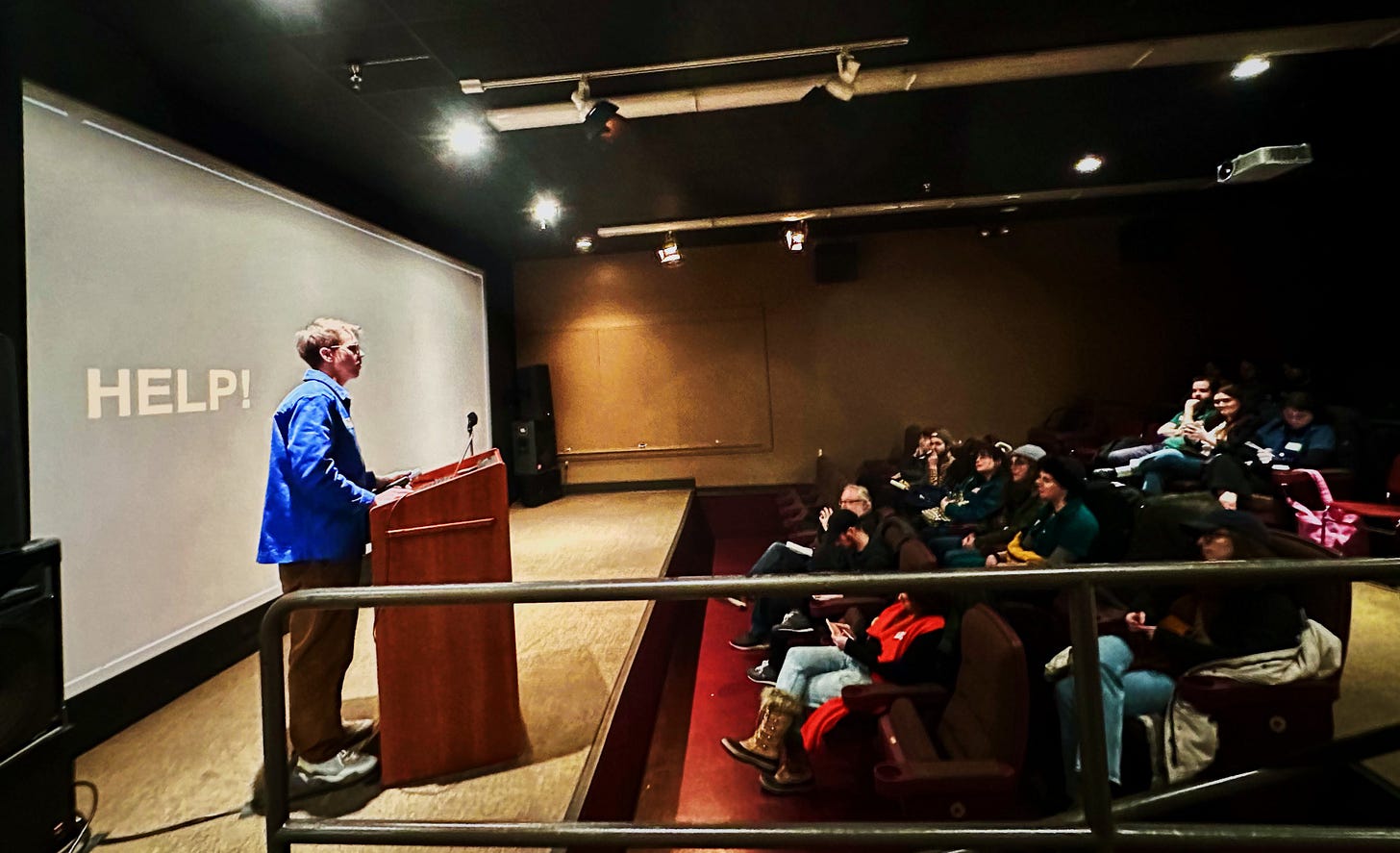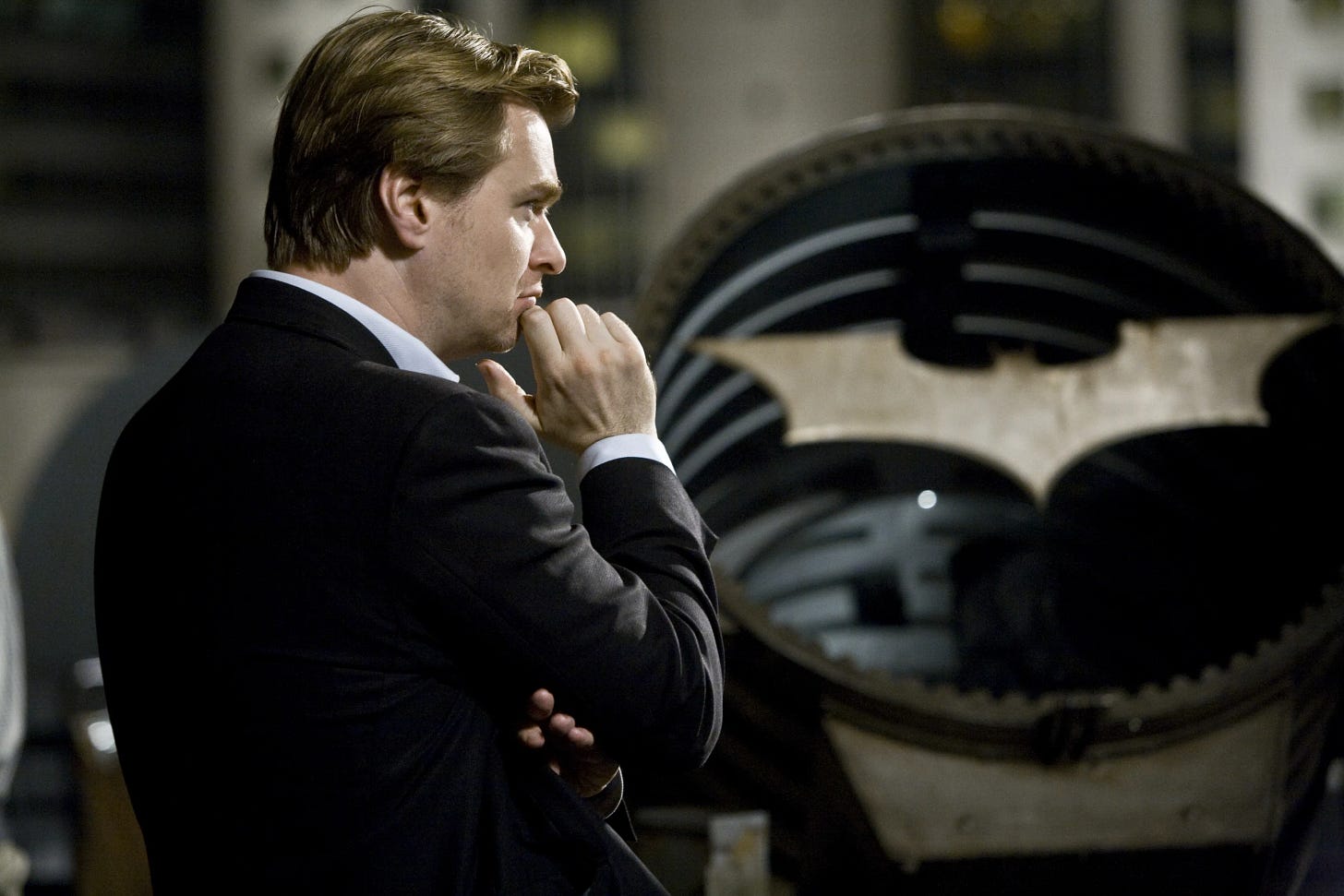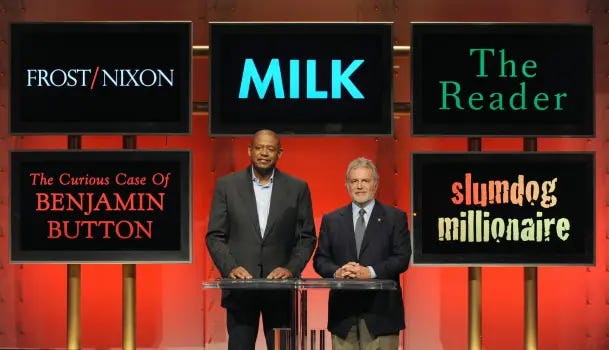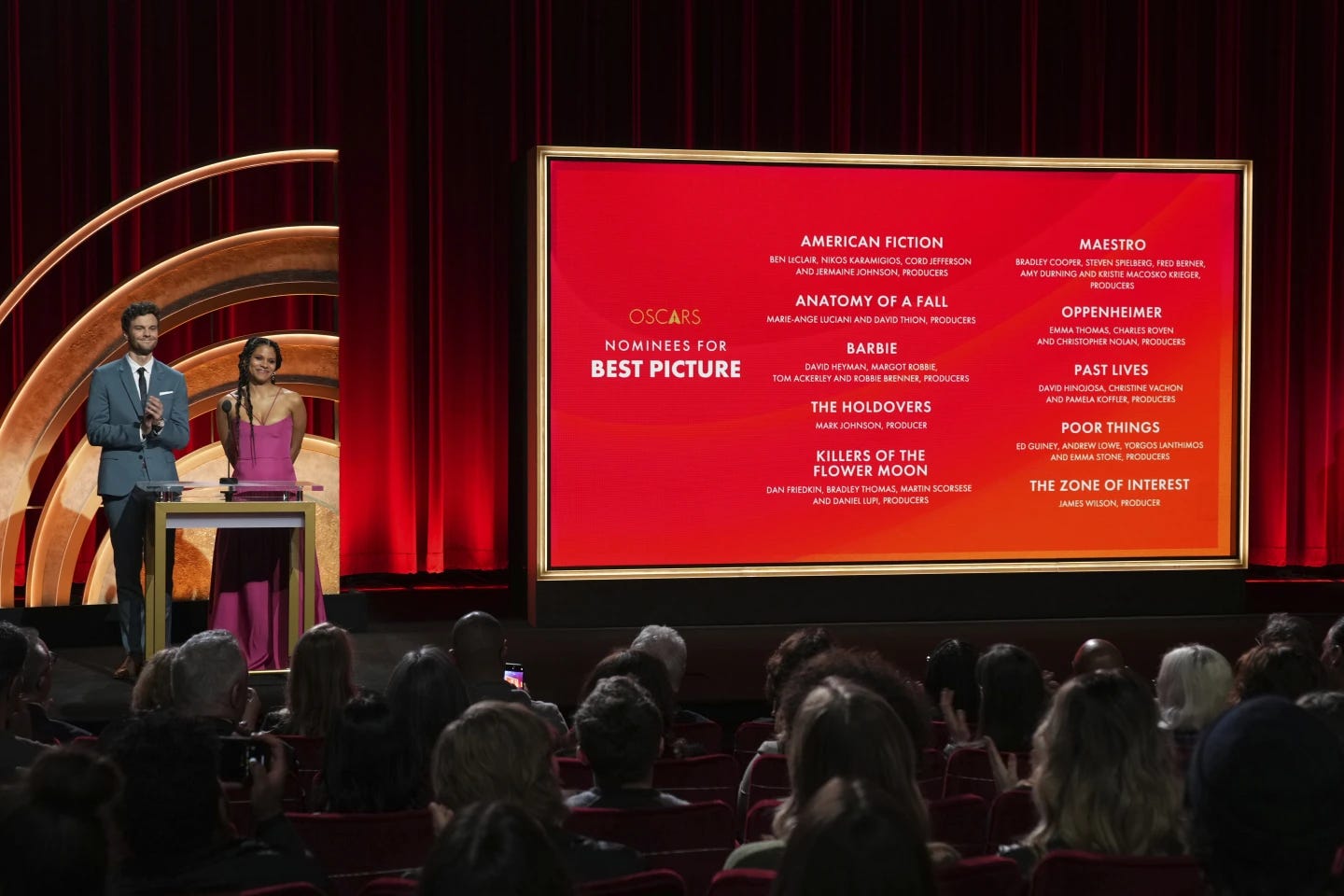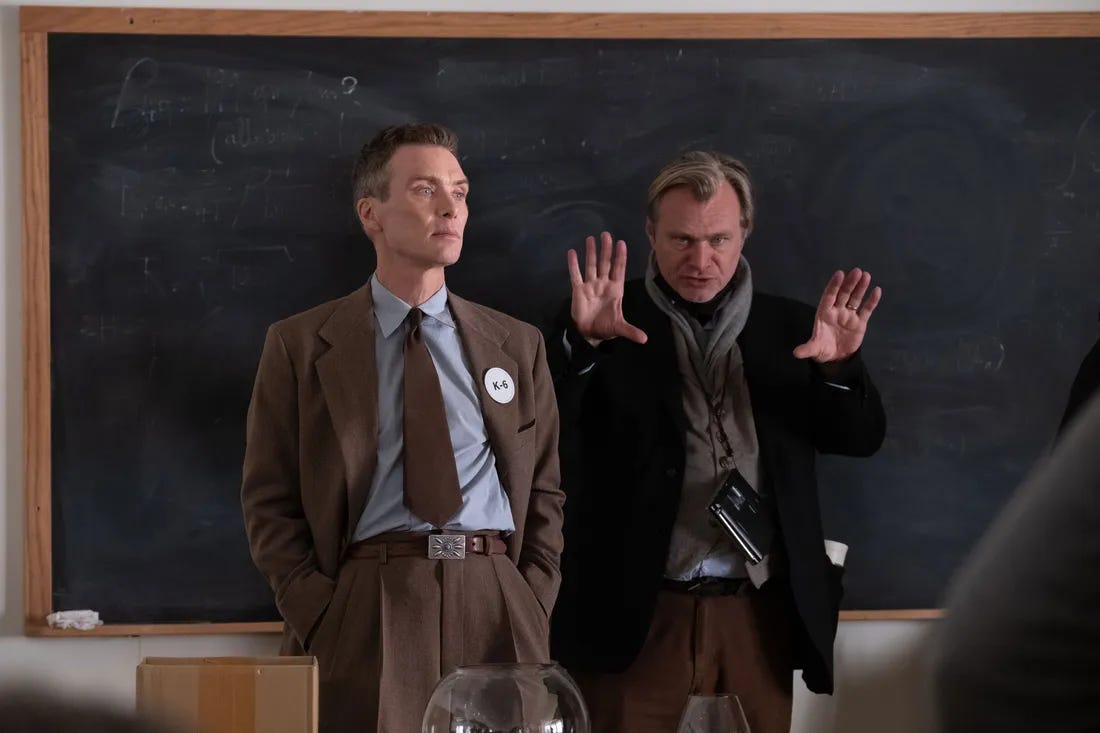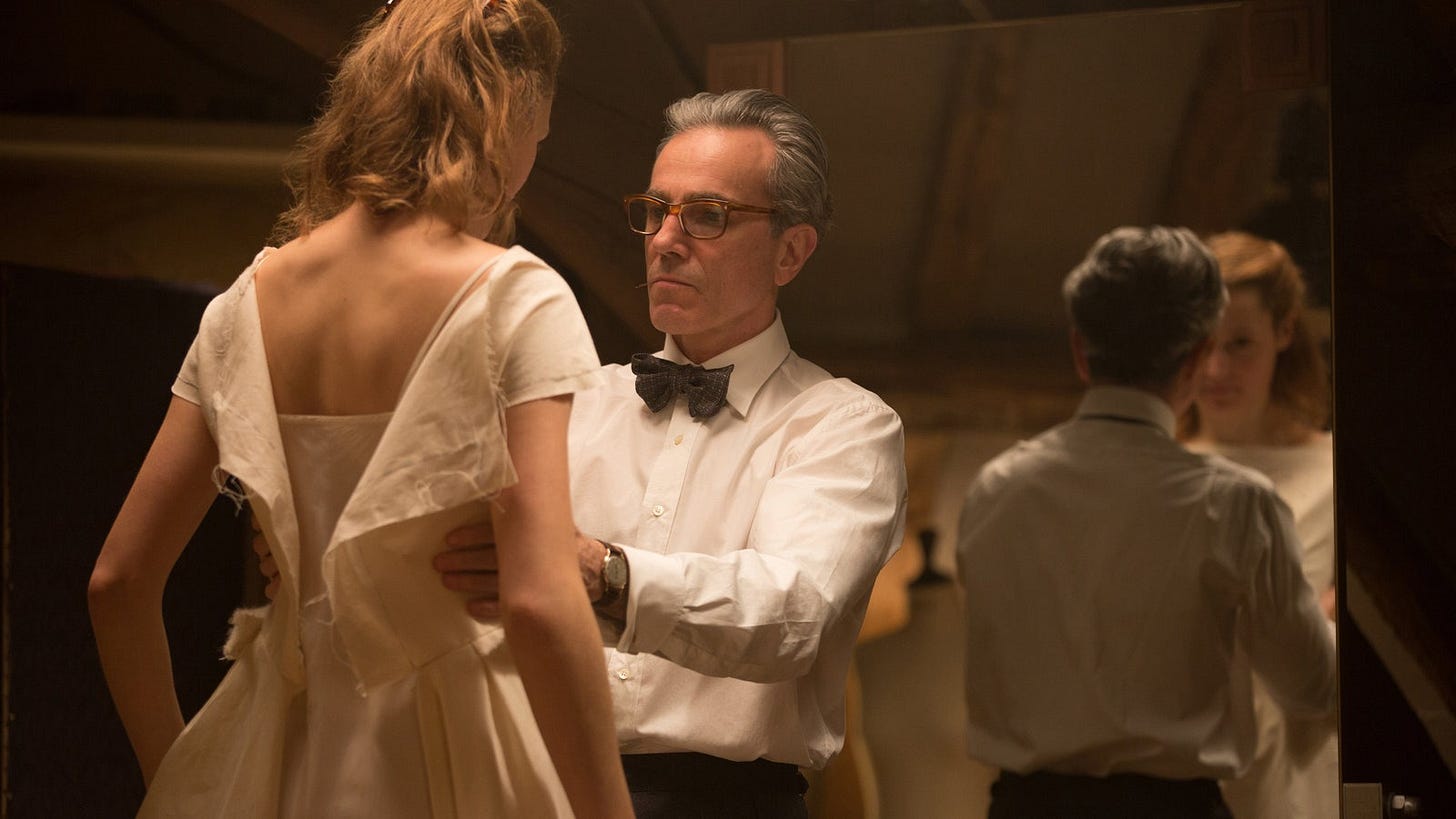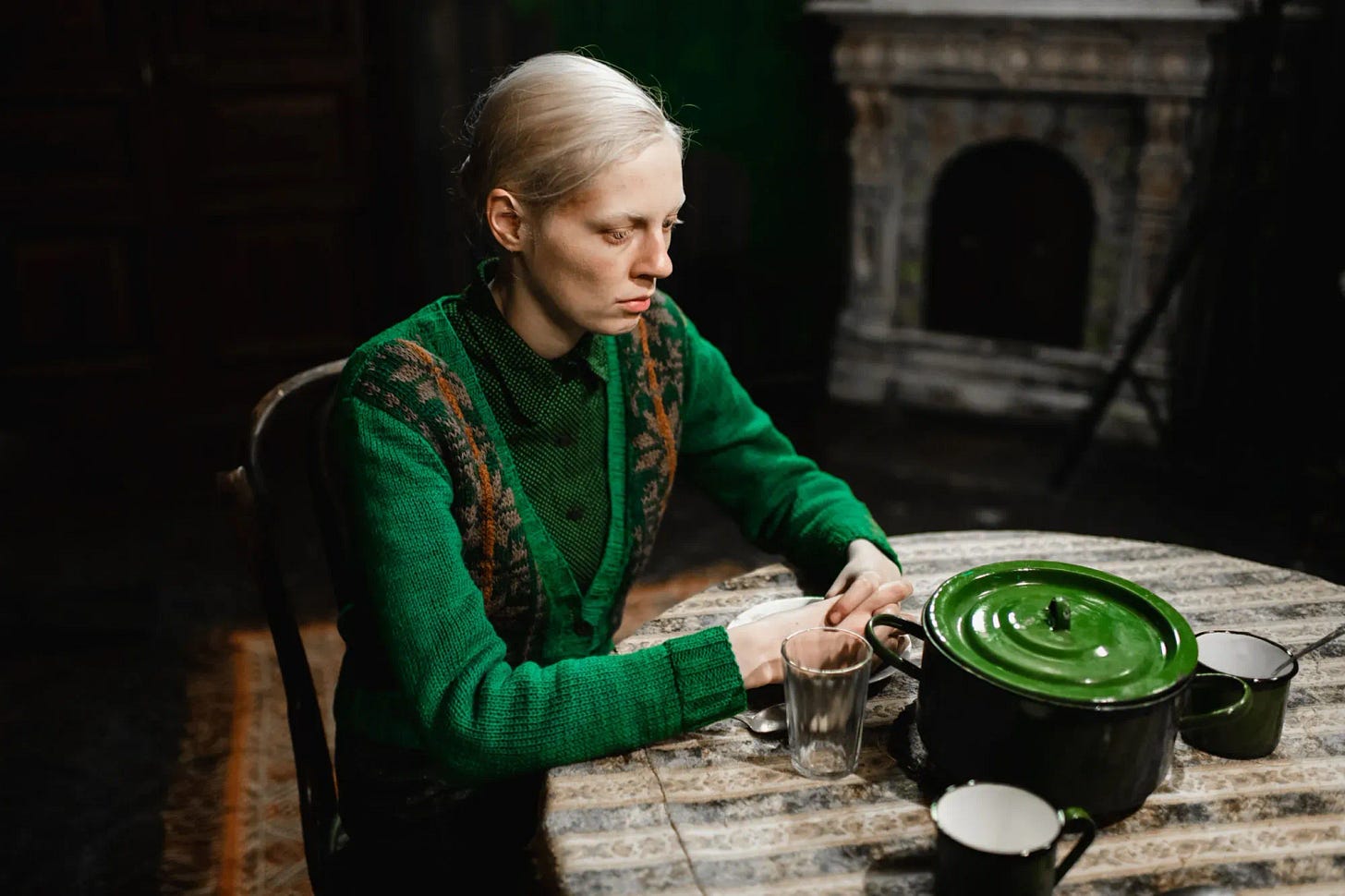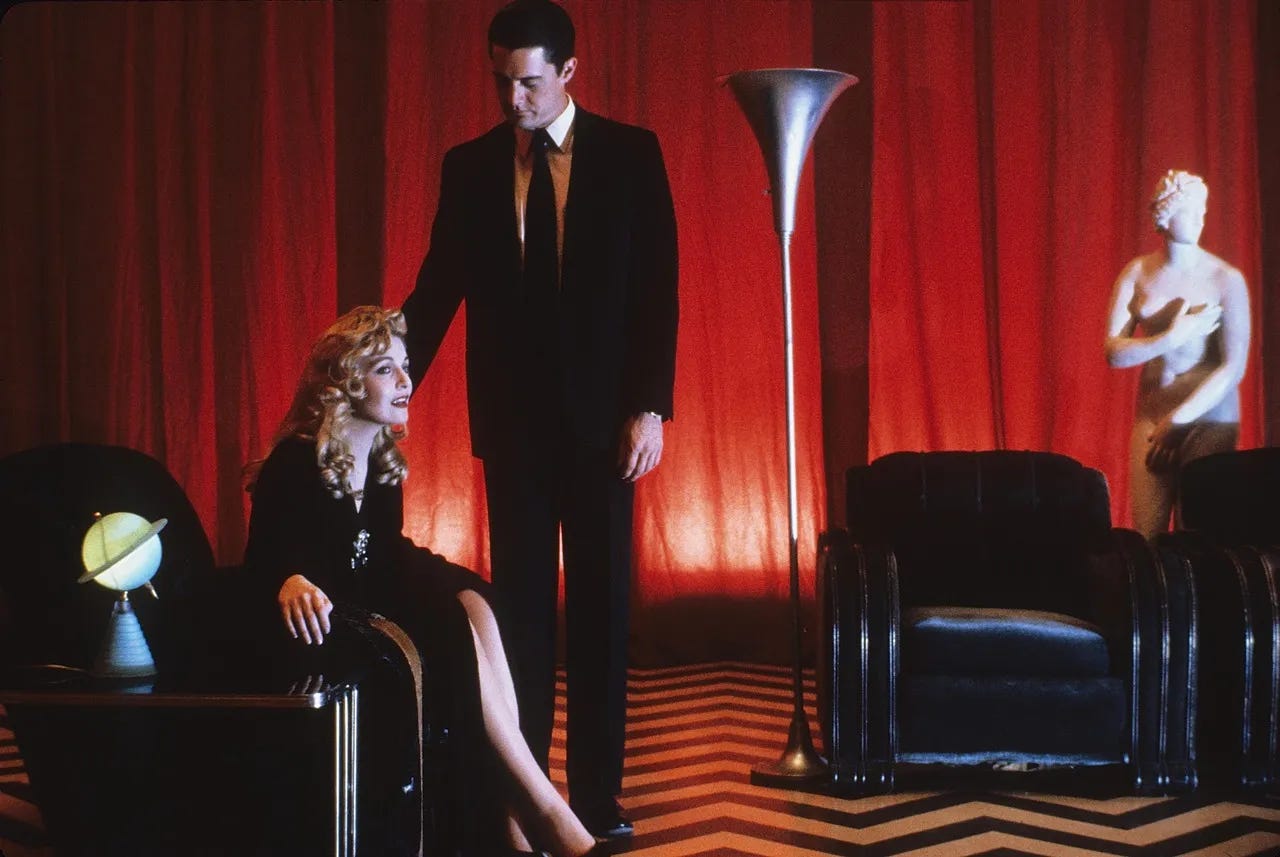[EDITED BY: GRIFFIN SHERIDAN]
Hello and welcome back to an all-new installment of BEAM FROM THE BOOTH brought to you by GRAND RAPIDS FILM SOCIETY!
Now that we officially find ourselves in February, we’re just weeks away from some of our most anticipated events of the year.
First — NEXT WEDNESDAY (2/14) on Valentine’s Day: PTA’s PHANTOM THREAD.
Then, just under 3 weeks away, on SATURDAY, FEBRUARY 24th: we’re celebrating TWIN PEAKS DAY once again with a COSTUME PARTY SCREENING of David Lynch’s FIRE WALK WITH ME.
Get more details and your links to tickets further down in our ‘Upcoming Events’ section.
From Open Projector Night to the Oscars, we have another packed newsletter for you all this week! Starting with...
FILMMAKER SPOTLIGHT:
Miles Davis Murphy
(Open Projector Night Winner, November‘23)
[BY: NICHOLAS HARTMAN]
Hey Miles! I hope you’re doing well and are all settled back home. Let’s kick this interview off with a simple question: who is Miles Davis Murphy? Give us a little bio.
Let’s see...I was born at home in Grand Rapids, in the Eastown area. My mom is a home birth midwife herself, so I grew up within that community. Music is a huge part of my life, I started playing when I was pretty young and — from my teens into my twenties — I played in various local bands. Mostly punk stuff, but I was part of a ‘dark wave’ project at one point. I’ve been writing for as long as I can remember. Short stories, poetry, music and songs. It’s always been something I’ve done. Most likely similar to people reading this, I’ve been obsessed with film my whole life, and as soon as I was able to get my hands on a camera I’ve been shooting. I don’t know, I never know what to say in these things. I think I’m a pretty nice person. My friends would probably say I’m a rascal. I love pizza and cats.
For those who haven’t seen your film Bestial Ones can you explain what it’s about and your inspiration behind the film?
Bestial Ones is a family drama which follows Fiadh (fee - ah) a young single mother who spends her days working as a home-care nurse and her nights amongst the grit and grime of Dublin’s DIY punk scene. She shares an inner-city flat with her father Danny and her eight year old son Maithi (ma - hee), who is having difficulty both in and out of school. There is a distance between the members of this small family. Maithi is a troubled child and needs the guidance and support of a present force, but Fiadh is struggling to connect with motherhood and mourns the loss of her independence. This friction has caused Fiadh to feel restless. When an old acquaintance returns to town, it presents an opportunity for escape, forcing her to choose between her child or the chance to leave everything behind. The film is set in Dublin, where I am currently based, but I took inspiration from my experience growing up in the GR punk scene, my relationship with my own mother as a young boy, and having a child myself when I was a teenager.
I feel like every filmmaker has that ‘spark,’ That moment where they say to themselves: “Yes, this is what I want to do, I want to make films.” Did you have that moment, and if so, could you share it with us?
I’m sure that I did, but I honestly can’t recall a specific moment. I’ve always been fascinated with film, and I think I got that from my dad. He’s a big cinephile, and when I was a kid I would go over to his house and we would just watch movies. He had a pretty big VHS collection, and he’d show me the all the classics or else we’d go to the rental store and watch something more current. I had access to so many films — a lot of which I shouldn’t necessarily have been watching at a young age — but that exposure definitely planted a seed. I eventually got my hands on a Sony Handicam and from there on out I was constantly making short films, either by myself or forcing anyone around me to be in them. In high school I had a film class, and for my final project we made a silly zombie comedy/musical. The story was intentionally bad, but the film itself was the most polished thing I’d made up to that point. It was the first time I had an actual crew as opposed to me and a few friends doing everything ourselves. I suppose that was when I had the idea that this was something I could actually do with my life, but I didn’t begin to pursue filmmaking in earnest until many years later.
Bestial Ones has a strong punk rock feel to it. From the costuming, music, and overall attitude. As one who grew up in a punk/hardcore scene myself, can you talk about your experience with the genre/scene and why you wanted to explore it in your film?
I got into punk music when I was pretty young, like 12/13, but it wasn’t until I was in high school that I started going to local shows and connecting with other people in the Michigan scene. I feel like that period in the early 2000s was a great time for the scene; you were really spoiled for choice between venues like Skelletones and the DAAC, and then all the shows happening in basements and DIY spots. And that was just in GR — there were great spots all over Michigan. There was just so much going on, and these experiences and meeting all of these people happened at such a formative point in my life that it definitely shaped me into who I am today. I’ve always loved the idea of setting a story within that world, but not necessarily making the “world” the focus of the narrative. Like you’ve got punk films like Suburbia (I actually love the film) that are loud, silly, and punk with an exclamation point, but then you have more understated things like This Is England, which has its setting within a counterculture but is really a film about grief and finding a place to belong. With Bestial Ones I wanted to make something more within that vein. I loved making the film, but I feel like I didn’t get to explore that world as much as I would’ve wanted. I didn’t scratch that itch, if you will, so I wouldn’t be surprised if I return to the world of punk in some capacity with future projects.
Let’s talk a little bit about your journey. You’re a Grand Rapids, MI native but moved to Ireland to pursue film. What was the decision behind the move and how has that shift helped mold your creativity?
So the journey was actually much more complicated. In 2013, I was working at a bookstore and one of GR’s plethora of breweries while playing in bands in my free time. I was in my early twenties, it was fun, but overall I wasn’t really happy. I was feeling stagnant. I had saved up a bunch of money over the years and was plotting a potential move out of state but, on a whim, decided to use the money to travel around Europe. Because this isn’t a biography of my life, I’ll condense the next few years down as much as possible. What was meant to be a summer trip turned into me falling love with the city of Berlin and deciding I wanted to stay there. I lived there for almost a year, busking on the street and doing bits of work under the table while I attempted to get a visa, which I was eventually denied. During that time, I met the Irish woman I would eventually marry and was able to secure a visa for Ireland and moved there instead. During that year, I started to make connections in the Irish film Industry and when my visa expired, we got married and moved to GR. We were in Michigan for almost a year before Donald Trump got elected, and we fled the country. That was when I made the decision to apply to the National Film School of Ireland. I absolutely feel like living abroad has expanded my influences. Having the opportunity to experience different cultures and meet people from all over the world has been invaluable. I’ve been exposed to art of all mediums which I probably wouldn’t have otherwise, and it has absolutely molded my creativity for the better.
As you know, Open Projector Night is a Michigan-based festival, and we do our best to celebrate MI filmmakers. We understand your film was shot in Ireland; however, can you express how your Michigan roots made you the filmmaker that you are?
I wouldn’t be the person I am today without having grown up in Michigan. I think all of the traits that are necessary to be a good filmmaker are bred into us here. There’s this fierce resilience that all Michiganders are brought up with which comes along with having to endure the extremes of each season, an adaptability and a DIY mentality when it comes to getting things done. We’re also so lucky to have access to all of this nature, even if you’re brought up in the city you’re almost never more than 20 minutes from the country. With that being said, there’s definitely things that I don’t like about the state, namely the religious and political conservatism that’s quite common, but despite that I am very proud to be from Michigan, and I wouldn’t change that for the world.
Let’s be honest: there’s so much that can go wrong on set, and it’s almost inevitable something will happen. Did you have a moment where something didn’t go according to plan and, if so, how did you resolve it and what did you learn?
We were honestly so lucky with how well everything went on this shoot. There was a lot stacked against us with the amount of locations and having to work around the constraints of child hours, but we’d done so much work in preproduction that when any issues arose I feel we were quite prepared for them — but that’s not to say that we didn’t have our stresses. One instance that stands out is halfway through the shoot we were on an exterior scene; it was freezing, and we were chasing the sun trying to make the day when our child actor reached a point where he did not want to continue. Working on set can be hard on anyone but particularly so for young actors. At the end of the day, they’re still kids. The hours are long and despite how prepared you may be there’s still a lot of sitting around between takes. Hughie was eight years old at the time, and this was his third full day in a row, which is a lot for an actor of that age, so as soon as I could see he was distressed we wrapped him out. We had to rewrite the scene on the fly as a result, but because of all the prep we had done we knew the important beats within the scene, so from there it was just finding a creative new way to land them. This is why I can’t stress enough the importance of really tearing apart your script in preproduction. If you’ve done your work, and know what’s important in each scene, then it’s so much easier to be open when things inevitably change.
I know this is a difficult yet cliché question, but I’m curious to know your favorite film, why, and how/if it played a role in your life.
I definitely do not have a favorite film. I have a list of about twenty films, and it is constantly changing, so I’ll give you five from it in no particular order. Blue Valentine by Derek Cianfrance, Chungking Express by Wong Kar-Wai, Fishtank by Andrea Arnold, Jaws by Steven Spielberg, and Titanic by James Cameron. I don’t even care what anyone may think about the last one, I unabashedly love Titanic — it’s a beautiful film. I’d also probably put Mike Leigh’s Secrets & Lies on there. And maybe Seven Samurai. Also The Thing. See? I cannot answer this question, I’ll just go on and on. I do think that Blue Valentine doesn’t get the attention it deserves, I never really hear anyone talking about the film, and I think it’s fantastic. It’s a beautiful yet heartbreaking depiction of how a relationship begins, grows, and eventually ends. Powerful performances. On the topic of films about relationships ending, 45 Years by Andrew Haigh is also brilliant. I also love Shane Meadows. I’m going to stop now.
Filmmaking is like a game of telephone. You write your script and then pass it off to others such as the actors, cinematographer, etc. I know you wrote Bestial Ones so I must ask: do you feel like your vision was compromised in any way or do you feel what you wrote was delivered how you visioned it?
There are a couple scenes and beats within scenes that were shot but inevitably didn’t make the final cut of the film. They were either superfluous or I didn’t cover them properly, so we didn’t have what we needed to make them work in the edit. Some of these I really wish we could’ve made work, but it’s all part of the learning experience. Ultimately, the film is stronger without them, but it’s also stronger because of the collective talents of everyone involved. The actors were able to transform these characters from something on a page into “real” people with aches and needs, the cinematographer captured the nuances of their performances and used lighting to create appropriate moods for each scene, and the production designers created the whole world. That’s what I love about filmmaking: the collaborative nature of the medium. As a writer/director, I get to design a story, but it’s the strengths of the team that turn that world into something greater. Obviously there are times out of necessity where, as filmmakers, we are forced to wear many different hats, but there is always someone who is better at a particular craft, and if you have the luxury of gaining their inputs and expertise then you are going to have a better film as a result. So no, the final version of Bestial Ones is not exactly how I envisioned it. It’s very close, but I actually believe that our end result is better.
This is kind of a cheesy question, but it’s something I like to ask all of our award-winning filmmakers: if you were granted an unlimited budget and you can make your dream film — what would it be?
I think my answer to this question would change constantly depending on what I am working on at that moment in time. My taste in film is all over the place, and I have favorites in pretty much every genre. As much as I love an old-fashioned big epic, I’ve never had a desire to make one, so I don’t think I’d need an insane budget for anything I’m excited about at the moment. I’m currently developing a story for a feature and because its the freshest in my mind that would be my dream film right now. Ireland is currently in the midst of one of the worst housing crises in the world. In Dublin, rent prices are quadruple the average wage and foreign vulture funds are snatching up property and sitting on them to drive up prices. That’s the backdrop for our story. I don’t want to say too much, but it’s kind of a fish-out-of-water crime thriller about a group of housing activists who attempt to get even with a local slumlord by trashing his house, but things go horribly wrong in the process. Think Green Room meets Good Time.
What’s next for Miles? Any new films in the works or any other creative endeavors you’d like to share?
Something great about Ireland is they have a state development agency for the film, television, and animation industries called Screen Ireland which provides funds for the development, production, and distribution of films. It’s extremely competitive but an incredible resource. I have a production company attached to my new short film script titled Hounds, and we’ll be applying for production funding from Screen Ireland this year. So, if successful, we’ll hopefully be shooting that sometime this year. Then there’s the feature I’m developing, plus a few other ideas I’ve been tossing around. And probably one of the biggest goals of mine is to come home and make something in Michigan. Whether that be a short or feature (most likely a short to start), it’s something I’ve wanted to do for a long time. That’s one thing that really drew me to Open Projector Night, the chance to meet other Michigan filmmakers and make connections. I’ve been gone for a long time now and am very much in the dark about what’s happening on the film scene here, so it was really exciting to check out some of the local talent and meet — hopefully — future collaborators.
How do we stay up to date with you and see more of your work? Do you have any social media/websites you’d like to share?
I do have an Instagram, but I’m not the most active person on social media. You can give me a follow (at) voidtalk and keep up to date with my life and projects, or you can always shoot me an email at milesdavismurphyfilms@gmail.com if you ever want to get in touch.
If you could go back in time and give advice to your younger self when you were just starting out as a filmmaker, what advice would you give?
In a lot of ways, I feel like I still am just starting out. I’m still discovering new things about myself and filmmaking with every project, experimenting with different genres, techniques, etc. If I had to say something, I suppose it would be that perfection is an illusion — it doesn’t exist — so don’t put off writing that script or making that film because you’re waiting for everything to be perfect. Just do it, and however it turns out you’ll have made something, and you’ll have learned something. I basically have to remind myself of this every day.
Any words on Open Projector Night?
I think it’s incredible that Open Projector Night exists. It’s wonderful for the filmmakers to have this platform to showcase their work, and it’s great for the community to be able to experience the creative talents of Michigan filmmakers. It’s clear that a lot of thought goes into the curation of films, the organization of the event, and the night itself. Big, big love to everyone involved in Open Projector Night, GR Film Society, and the Wealthy Theater for all that you do for Michigan film, and I hope to have the opportunity to screen more of my work at future events. Thanks for letting me ramble to you...and if you’ve made it this far, thanks for reading.
A WRITER’S EXPERIENCE AT PITCH NIGHT
[BY: MATT EVERITT]
Few things have made me as anxious as preparing for Pitch Night. I felt this huge sense of “They’re all going to laugh at me aren’t they? This is a dumb idea. At least I’ll know how dumb my idea is before the night is over.”
I imagined I’d get up there, stumble through a few incoherent ideas, and get a few responses from the panel who’d indulge my efforts with generic questions.
I’ve never been so happy to be wrong in my entire screenwriting career.
I wanted to share my takeaways in hopes of encouraging other screenwriters to embrace the anxiety and pitch — because holy shit, it was totally worth it.
I have never felt more supported by my community: I knew going in there were three of us pitching, so in my head I worked out that if each pitcher brought a couple friends we’d have a respectable crowd of like fifteen people, and I could limit my humiliation. Turns out we have a wildly supportive film community here in GR, and enough people showed up to pack out Wealthy Theatre’s microcinema which, surprisingly, calmed my nerves quite a bit. If this many people chose to take time out of their night to come here and listen to some screenwriters open up, they all can’t be hoping we fail. There were so many people who shared their contact info with me to keep in touch and to hear more about the project. I have that sign up sheet on my fridge like a 4.0 report card, and it genuinely boosts my day every time I see it.
The panel: I got questions that revealed my blind spots in a gentle way. Time after time, pitch after pitch, they had questions we couldn’t answer on the spot. I could have skipped Pitch Night and kept writing and realized six months on I missed the boat on some big emotional beats. Or, worse yet, that the thing I’m most excited about in this story only happens in the last five pages, and I’d just written a lot of scenes to get to the last five pages faster rather than recalibrate the film to carry that energy throughout. Instead, I was able to course-correct in a way that felt true to my story and my voice. heir feedback helped my script become more “me.”
Fast, practical help: I shared how I was writing about a string physicist and had cold emailed a few but have yet to hear back. No joke, one of the panelist’s spoke up immediately and told me her family member was one and would make an introduction. Three months of dead ends fixed in a minute of vulnerability! Plus, there were film recommendations from the panelists and the crowd to check out that I had totally overlooked. I watched them both and literally stole an approach to a new scene from one of them.
The last point is hopefully my most compelling point for other writers: I wrote more freely that weekend after Pitch Night than I have this entire process. There was a clarity I gained from sharing my pitch with others mixed with a renewed sense of excitement I got from everyone’s encouragement. Anything that can ease the process in my mind is a huge win.
One of the big rules of screenwriting is to put your big blunt ideas in the subtext, but I’ll save that for the script and just share this point blank:
Pitch Night felt like the single best resource in Grand Rapids for any screenwriter, aspiring filmmaker, or people looking to support quality films getting made here. If you’ve thought about it but told yourself you’re not a good fit, or you don’t know how to do it, or you hate speaking in front of people — all I can say is you’ve got a lot more to lose by not taking a chance on yourself to enjoy the embrace of the community than keeping to yourself through the process.
ROAD TO THE OSCARS 2024
SENSELESS SENSIBILITIES: NOLAN, GERWIG, AND WHAT IT TAKES TO BE NOMINATED BY TODAY’S ACADEMY
[BY: KYLE MACCIOMEI]
This article is the second in a series of Beam from the Booth articles covering the upcoming 96th Academy Awards. Continue to check back in throughout these next few issues for further thoughts and commentary on this year’s awards.
Last issue was dedicated to the overwhelming public backlash to the 2024 Oscar nominations, directed primarily towards the absence of Greta Gerwig for Best Director and Margot Robbie for Best Actress. While the conversation online felt endless, it was hardly the first time that a noticeable absence in nominations led to public uproar. As we discussed prior, there have been many historic upsets in Oscar history, some worthy of indignation and others not so much. But there is one moment in this institution’s history that I want to dive deeper into, and I believe doing so will greatly enhance our understanding of the current landscape of cinema politics.
Prior to this year, the most infamous Oscar nominations announcement morning of the 21st century was in 2009. Back then, the summer phenomenon/culturally subversive/box office behemoth title of the year belonged not to the pink-filled Barbie but instead Christopher Nolan’s dark and brooding The Dark Knight. After becoming the surprise smash of the decade (second only in box office receipts to Cameron’s Avatar), Warner Bros. decided to push an ambitious awards campaign to break precedent in an attempt to receive major Academy Award nominations for a comic book adaptation.
And it worked! The Dark Knight ended up with eight nominations overall, which eventually turned into two wins for Sound Editing and Supporting Actor. This, though, did not come without controversy. The Dark Knight had missed out on two of the biggest nominations available: Best Picture and Best Director. For years, the Academy had been shifting its focus away from mainstream, four quadrant, box office successes in favor of more independent, challenging, and ‘important’ films. Classic Oscar bait. The Dark Knight, as perceived by Academy voters, still had the stigma of being a superhero film from a decades-long franchise. So it was to be, this time, that Nolan would lose his chance at the Oscar gold (and the next, and again, and the time after that).
Looking into how the Academy votes for these awards can help us understand why it is so often that popular films get overlooked by this institution. Currently, the Academy has just over 10,000 members. It’s essentially invite-only and exclusive to feature film professionals who, if well-known enough, can join any of its 18 branches. These branches are diverse, ranging from the prestige (writers, directors, and actors) to the technical (casting directors, sound designers, and VFX artists) to the commercial (studio executives, talent managers, and marketers in public relations).
Because of this exclusive system, the Academy voting body has often received accusations of being elitist and naive to moviegoing trends, and the 21st century solidified that reputation as they continued to focus on films they deemed ‘important’ and of a ‘higher’ artistic quality than the crowd-pleasing pictures that drew mass audiences.
And so it was that the Oscar nominees of 2009 went to films representing this ‘important’ aesthetic, and the widely-adored The Dark Knight was excluded. The public backlash to this decision was clear, and the Academy had a vested interest in maintaining both relevance and the appearance of respectability for an American public that was becoming increasingly isolated from the prestige films it was selecting to award. In response, the governing board decided to increase the total number of Best Picture nominees from a measly five films to a new maximum of ten. The goal here was to better accommodate well-liked popcorn flicks that the general moviegoing public were buying tickets to see.
This move yielded mixed results. There has been a noticeable increase in box office successes represented in the category (Avatar, Mad Max Fury Road, The Martian, and Black Panther), but the overwhelming majority of Best Picture nominees continue to be humanistic, festival-launched, independent dramas. Additionally, ratings for the Oscars telecast continue to drop as do all other major televised award shows across the board.
What I find interesting about this story is the connection between The Dark Knight’s perceived failure at the Academy Awards in 2009 and that same perception plaguing Barbie last week: the belief, for some, that a film had not received just recognition from the voting body by being excluded in two major categories...but still receiving exactly eight nominations in various categories. Taking this analysis a step further, we can even find similarities in the type of films competing against both The Dark Knight and Barbie for their coveted nominations.
Just three years prior to The Dark Knight’s release, Kate Winslet played a parody version of herself in HBO’s Extras on the fictional set of a World War II picture (I promise this is relevant). In one scene, she jokes that the most successful method for getting an Oscar is actually quite simple: make a movie about the Holocaust!
It turns out Momus (the Greek god of irony and satire) was watching Ricky Gervais’ HBO program because, in 2008, Winslet starred in The Reader — a German-American romantic drama about the Holocaust that would finally get her an Oscar win after five unsuccessful runs.
This is an oft-cited and repeated story in Oscar lore, and I bring it up because it reflects the Academy voting sensibilities that still exist today. These are the very same sensibilities that motivate certain branches, specifically the directing branch, to avoid highlighting large studio projects like The Dark Knight in their category. That was a moment so pronounced in 2009 that Hugh Jackman felt the need to highlight the feeling in his outstanding opening monologue to kick off the ceremony.
Jump forward fifteen years to the present day, and we see history repeating itself as Barbie’s director finds herself similarly snubbed as another Holocaust-related film’s director takes her place. While The Reader may have prevented Nolan from Oscar success, this year’s The Zone of Interest may have done the same to Gerwig. The Zone of Interest tells the story of the Nazi commandant who ran the Auschwitz concentration camp and his family who resided in a somewhat-isolated compound just alongside the untold horrors of the Holocaust. A deeply unsettling and groundbreaking film, it is exactly the kind of subject matter that the Academy prefers to highlight (even if its structure and format veers heavily into the experimental). Director Jonathan Glazer received one of the Best Director nominations that might have gone to Gerwig, and so it is again that this historical subject matter continues to reign supreme.
There seems to be this repeating connection between the careers of Christopher Nolan and Greta Gerwig. The two repeatedly lean hard on consistent themes throughout their works, Nolan’s obsession with time and Gerwig’s fascination with girlhood, womanhood, and the coming-of-age drama that connects the two. Both had humble beginnings working on micro-budgeted passion projects, then moved to medium-sized hits that resonated strongly with critics and cinephiles before leveling up their worldwide recognition by maintaining their unique aesthetics as they produced high-quality films with established intellectual properties and franchises. Both, then, get excluded from direct recognition in the Best Director category at their peak due to the nature of how the Academy discredits studio hits...and the film that butts them out of their categories for recognition is a historical drama that centers on one of the most challenging and harrowing times in human history. It’s fascinating then to consider that Nolan paved the way for Gerwig to get a Best Picture nod for her film as his failure in 2009 led to a change in how the Oscars function to better accommodate the work she is now pursuing.
If anyone is interested in understanding Gerwig’s current and future prospects as a filmmaker, I recommend you read The New Yorker’s examination of Mattel’s future in adapting their products into media projects. In it, Gerwig’s agent, Jeremey Barber, says: “Greta and I have been very consciously constructing a career... Her ambition is to be not the biggest woman director but a big studio director. And Barbie was a piece of I.P. that was resonant to her.”
Same as how Nolan tapped into Batman to launch his brand into the stratosphere, Gerwig is on a similar path as she latches onto existing properties that she knows will give her the endless resources she needs to become a juggernaut of the industry. With only three feature films under her belt as a solo director, Gerwig is now primed to direct an upcoming Chronicles of Narnia film for Netflix. Anyone confused by this choice should better understand where Gerwig sees herself in ten years: as a mainstream auteur with the same cultural recognition as Spielberg, Tarantino, and Nolan. And, just like these filmmakers, being excluded by the Oscars seems to be a right of passage as they prove themselves to the elite Academy.
Just as Spielberg was rejected by the Academy for his work on Jaws before finally finding success with Schindlers List, Christopher Nolan caved to Oscar sensibilities and created his own WW2 epic (twice) to finally be recognized by the Academy as one of the most influential directors of our time. Perhaps, then, Gerwig will take a similar route with a biopic that best caters to what Academy voters want to see from them.
What this means for us, though, is that we should continue to buy stock in Gerwig who is still just at the beginning of her career. And as the Academy continues to roll out the red carpet for an expected Oppenheimer victory in both Best Picture and Best Director, we can finally consider what Christopher Nolan’s career will look like after being validated by the establishment community that has failed to do so in the past. The better question, however, is whether the Academy will continue to favor niche and prestige dramas in favor of high quality populist crowd-pleasers...and, if so, what does this do to our favorite filmmakers who often find themselves at odds with this archaic and dated system that we all still buy into?
Special thanks to Kirsten Fedorowicz for editing assistance.
UPCOMING EVENTS
PHANTOM THREAD (Anderson, 2017)
WHAT: A special Valentine’s Day screening of Paul Thomas Anderson’s tale of twisted romance and dressmaking starring Vicky Krieps and Daniel Day-Lewis in his final performance on film to date.
WHEN: Wednesday, February 14th, 8:00pm
WHERE: The Wealthy Theatre
BEANPOLE (presented by CHIAROSCURO INTERNATIONAL FILM SERIES)
WHAT: During World War II in Leningrad, the siege of the city is finally over, but life and death struggles continue in the wreckage that remains. Two young women search for meaning and hope during their struggle to rebuild their lives amongst the ruins (FREE screening followed by discussion and reception).
WHEN: Sunday, February 18th, 2:00pm
WHERE: The Wealthy Theatre
TWIN PEAKS DAY: FIRE WALK WITH ME (Lynch, 1992)
WHAT: Our 2nd Annual ‘Twin Peaks Day’ celebration! Come dressed as your favorite character for a screening of the David Lynch-directed feature film that acts as both a prequel to the iconic television series and a final installment in the story of the show’s original run.
WHEN: Saturday, February 24th, 8:00pm
WHERE: The Wealthy Theatre
And so we’ve arrived at the end of another BEAM FROM THE BOOTH! We appreciate you taking the time to read it and truly hope you’ll continue to do so. Be sure to SUBSCRIBE to get each issue in your inbox every MONDAY, and stay up-to-date on all things GRFS.
Plus, join us on social media! We’d love to chat with everyone and hear YOUR OWN thoughts on everything above (you can also hop in the comments section below).
Know someone you think will dig BEAM FROM THE BOOTH? Send them our way!
Look for ISSUE #44 in your inbox on NEXT MONDAY, 02/12!
Until then, friends...




